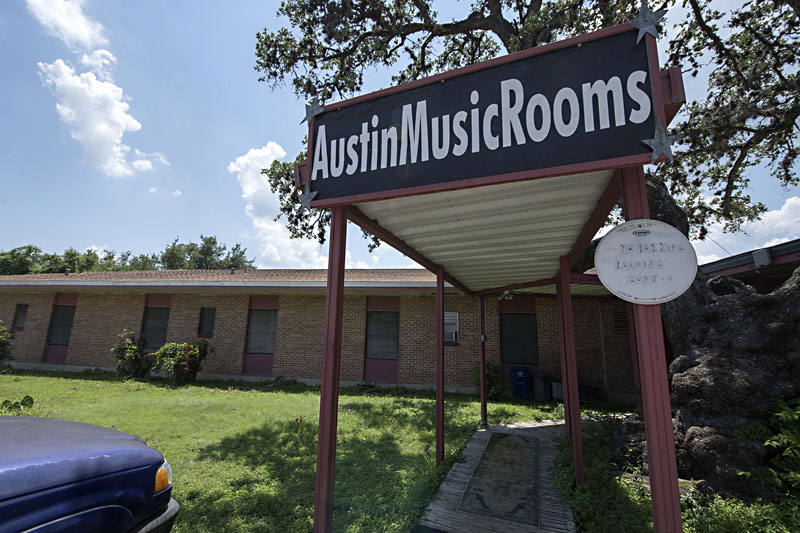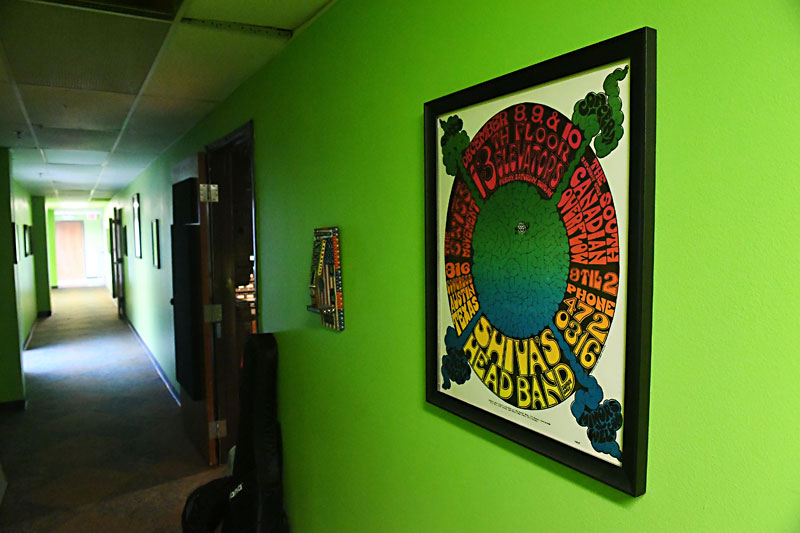Bands Are Practicing Again, but Does Austin Have Enough Rehearsal Space for Them?
A love letter and state-of-affairs on the practice space scene
By Kevin Curtin, Fri., June 18, 2021
"I'll tell you a secret: I have dreams about the [Austin Rehearsal Complex], a couple a year," reveals Don Harvey, as if talking to a therapist. "It's always the same thing, I get there ... and it's still open.
"And I say to myself, 'Shit! How did I not know the ARC is still open?'"
In waking life, that bygone practice space might as well represent an ancient civilization. Nary a trace of it exists among the hotels and multiuse developments running behind South Congress Avenue on Music Lane. Perhaps the most culturally endeared business of its kind in the city's history, Austin Rehearsal Complex closed in 1999. No surprise, though, that more than two decades later the ARC exists in the dreamscape of Harvey, a drummer who opened the business in 1990 with local band manager and booker Wayne Nagel.
Where bands practice, you see, it's sacred ground. That's not a valuation of the room's size, condition, or cleanliness – many spaces are repugnant caverns of sweat residue, cigarette ash, and beer can debris with substandard temperature control – but rather, acknowledgment that divine musical instances take place there.
The alchemic flash of a song creation manifests more exciting than when those chords, rhythms, and words step onstage.
Enduring friendships, bonds thicker than blood, and deep psychic relationships develop therein. So does flatulence, waiting on unpunctual bandmates, and finding your snare head broken from another drummer that shares the room.
"There were no professional rehearsal facilities of any kind," says Harvey of Austin's practice space landscape before the complex opened. "People rehearsed in storage lockers and their living rooms. At the ARC, we wanted everyone to feel like they deserved a really nice space where they were treated well, which musicians aren't.
"Musicians aren't used to being treated well."
Primarily, spaces at the ARC rented hourly, starting at $7, but acts including Meat Puppets, Ian Moore, Pariah, and Charlie Sexton held "lockouts," the term for ongoing leases. Other frequenters, such as the Fabulous Thunderbirds and Stephen Bruton, kept their gear in rented storage lockers.
"ARC kind of was the music community," reflects Harvey when prompted about the facility's reputation as a cultural hub. "I'm sure there's plenty of music that came to be that wouldn't have had it not been for people meeting there."
Sexton says he often spent 16 hours a day writing and recording in the narrow quarters he inhabited for ARC's decade of existence, which ended amid an ousting and ensuing lawsuit with a landlord who'd bought the building.
"Some of the most interesting music I ever heard was during those days because, like most rehearsal spaces, it wasn't really well insulated," muses the singer and guitarist, whose Arc Angels derived their name from the compound. "Sometimes I'd hear something and think, 'Oh my God, that's so cool, it's like a punk band with a tenor saxophone player and this other thing going!' Then I'd run down the hall to see who I was hearing and realize it's three different bands."
What typifies the legacy of the ARC? According to Harvey, the SIMS Foundation. That nonprofit, providing mental health and substance abuse support for Austin musicians, culminated around the rehearsal complex following the suicide of Pariah bassist Sims Ellison. That's proof that forces greater than amplified sound emerge from practice spaces.
Asked what feeling strikes him when he drives by the old property, now a parking garage for tourists staying in $200-plus per night hotels, Harvey pauses.
"It's melancholy, but nothing stays the same. That's life."
When Music Lab confirmed the impending closure of their last remaining facility in January, steam billowed out the ears of townies over its successor: a Tesla showroom. Writing appeared on the wall for the city's most prominent rehearsal business once the flagship location on Oltorf sold two years prior and the pandemic stifled business at the St. Elmo outpost. Coupled with the preceding closure of another long-serving local facility, Band Co-Op Rehearsal Studios, a narrative emerged that practice spaces are an endangered species in Austin's sky-high real estate market. Still, as live music awakens from a 16-month hibernation, the reverberations of bands practicing can be heard all over town.
Spaced Out
"It was brutal, dude," says Will Harrison, owner of Space ATX, about COVID-19 shutting down his business. "We'd been jamming, then with the pandemic ... zero! Now that things are opening back up, we're starting to get back to where we were and I think that tells you everything you need to know: Music's alive, music's back, people are busting out, and bands are ready to play."
The two-story, aesthetically agreeable, hourly rehearsal facility inhabits a 9-acre lot in deep South Austin that once housed a creationist Christian school, the vibes of which Harrison undid with a mojo ritual involving a Townes Van Zandt album on repeat. When Space opened in 2012, Austin boasted more available creative facilities and Menchaca Road seemed farther away. These days, veteran practice space manager Sonny Bishop counts plenty of rentals to puzzle out between the building's 31 rooms.
While the bread and butter of Space's clientele remains musicians woodshedding, they also get usage from freelance theatre groups, photographers, recording engineers, and videographers. The only rental they ever turned down? A nudist event.
"You'd be vacuuming pubes up forever – can't have that," jokes Harrison.
As Harrison and I occupy the building's communal smoking deck, Austin's famed psychedelic unit the Black Angels set up for a filmed live performance in a large studio suite. The Space's video department evolved out of the pandemic, a rare period of downtime that allowed the staff to sit down and hash out new projects. A forthcoming online series, shot by Brazilian videographer Cléver Cardoso, features homegrown acts performing among colored lights, captured in exceptional cinematography with primo sound. In it, you see a confluence of environment and disciplines that exemplify a multiuse creative compound.
The Space isn't the only rehearsal room in town that's clean, well-equipped, and tastefully lit. Waveform Austin, a smaller but similarly hourly rented joint on North Lamar, holds the atmosphere of a tidy home studio. Even so, most of Austin's band practice terrain, especially lockouts, exist as no-frills repurposed spaces infrequently encountered by vacuum cleaners.
They do, however, provide the true necessities: four walls, a couple power outlets, a place to pee, and – god willing – a vent that blows cold air.
Entering Austin Music Rooms, you time-warp into an era of this town when rent's still cheap, businesses don't require a conceptual vibe or interior design budget, and bands coalesce though thumbtacked messages on a bulletin board: "Bass player and drummer wanted for war metal trio." Built in 1959, the building formerly operated as a nursing home, which gives reasonable probability that you're practicing in a room where someone died – or, at the very least, shat themselves. Still there's magic in the three dozen or so matte black cells with solid soundproofing.
Neither founder Kirk McDow nor the friendly live-in superintendent, Rusty, returned requests for an interview, so Austin Music Room's current occupancy is unknown, but a recent visit found music emanating behind many doors. The future of the South First property seems less certain: Realty Austin lists it for sale at seven figures.
Not for sale are the memories I made during seven years of practicing in unit 305. It was there I first jammed with my best friend at an after-midnight keg party in 2009; I met my musical heroes heaving amps down the hallways and recorded in one of the multiple studios that've inhabited the space. More than anything, I relished the safety net of knowing that if I ever got evicted from my home, I could crash there while I figured things out.
Speaking of sleeping where you practice, the Metropolis off East Riverside remains the only apartment complex I've ever encountered where "Goodbye practice space costs! Hello in-apt. studio!" is part of their pitch to potential renters. Residents are allowed to practice from noon to a generous 10pm. From my experience, you can usually hear at least two bands practicing and one guy incoherently slapping a djembe drum from your couch on any given evening.
Meanwhile, I've long believed that the best place to scout emerging musical talent in Austin is through the driveway of Central East Storage on East Fourth, where bands cram into shed-sized lockers. Since the units aren't soundproofed, you can hear a pretty honest mix of the band, and it's not uncommon for several bands to practice at once. Knocking on the door between songs to ask the band's name usually gets taken as a compliment.
No Occupancy
"A big part of my social life over the last 20 years has been band practice," considers John Christoffel, who plays guitar in the power-pop group Gentlemen Rogues and also manages Sonance Rehearsal Studios. "I always knew it was part of what made me content, but I realized it was even more important after it was taken away."
"Rehearsal" – drawing etymological origins from "herse," meaning "to rake over" – at times seemed like a slog 16 months ago. Now it's a blessing: congregating with your friends, creating, connecting, laughing at strange inside jokes. We missed that.
Many bands didn't assemble last year out of fear of transmitting the virus. Others could no longer incur the cost of rental spaces. During the pandemic, Sonance, which counts 50 lockout rooms in two office parks in North Central Austin, made "substantial concessions" on rent to existing clients, according to Christoffel.
"We wanted people to be able to keep their rooms and I think it worked because they did," he allows.
Affordability is an imperative balancing act when it comes to practice spaces, says Christoffel, who's overseen the rehearsal business since founder Jason Butler aka songwriter Thee Conductor sold it in 2019 after 17 years in business. Increasing property expenses, insurance, and repairs add up, so rents on long-held rooms occasionally rise, but he's extremely conscious to not price out the average Austin musician, asking himself, "Would I be able to afford this?"
Both Sonance facilities remained at full occupancy over the past year, with most of the rooms being shared by multiple bands and a waitlist for units that open up. Asked if Sonance received increased rental inquiries after Band Co-Op and Music Lab closed, Christoffel calls that "an understatement."
"The way I felt pre-COVID was that there weren't enough rooms in Austin for the demand," he explains. "Now with those places gone, the problem's doubled at least. We'd love to expand, but the real estate market's out of control. You'd have to be very rich, not like worth a million bucks – that's not even enough."
That calculation – the amount underpaid musicians can afford in rent, minus property costs – is a difficult ledger to see black ink on. Music Lab secretary Joe Cabela, asked by the Chronicle in January if it was possible to open a rehearsal space in Austin, replied: "I think it would be difficult within the city limits," citing "market rents" and "cost of construction."
Mosaic Sound Collective, a 25,000-square-foot music resource hub in East Austin, has a wing of 29 rooms intended for rehearsal rentals. Presently, half are being used by musicians and half are still slated for soundproofing: a difficult process, involving expensive materials, in which you construct air gaps and extend walls all the way to the roof to reduce frequency transmission. It's serious construction, but Mosaic owner Dan Redman, who fields calls from would-be renters constantly, sees affordable monthly practice space availability as "one of the biggest needs in the music community."
Bryan Nelson, operator of the avant rock label Australian Cattle God, calls lockout rehearsal rooms "the garden of all creativity."
"If you don't want to be an asshole to your neighbors, then you need to have a place you can go and let your freak flag fly," declares the guitarist/drummer. "They're total creative incubators and cities need space for that."
Nelson acted as a DIY practice space landlord for two decades, beginning in the Nineties, when he accumulated eight rooms in a building at San Jacinto and East Fifth also populated with Sweatbox Studio and KOOP Radio. He rented them for $200 a month, an amount that wouldn't even cover a night's stay at the Westin Hotel, which stands on that corner today. After the original building burned in 2006, Nelson turned several units at Capitol Office Park on Smith Road, near Bolm, into practice spaces and ran them until 2019.
He says it's difficult to find affordable spaces nowadays and notes that because Austin never had an industrial boom and blight, the city lacks "big empty shells to take over." So creative solutions remain in demand. Along with city subsidized rehearsal rooms, he ponders office buildings – having on-site staff diminished by the work-from-home revolution – as potential after-hours practice spaces for musicians.
"I know of one large, entertainment-related company that just built a giant building Downtown, then laid off most of their music creatives," he hints. "A company like that could dedicate a floor or two as a gesture of goodwill that also acts as an incubator for the future creative people in the city."
Rehearsal Spaces Index
Austin Music Rooms
4800 S. First, 512/663-2808
Central East Storage
3222 E. Fifth & other locations, 512/385-5801
RockBox Rehearsal
13200 Pond Springs, 512/751-2277
Sonance Rehearsal Studios
1029 Reinli & 204 W. Powell, 512/522-8108
Space ATX
7915 Menchaca, 512/448-9518
Waveform Austin
8204 N. Lamar, 512/222-7961










